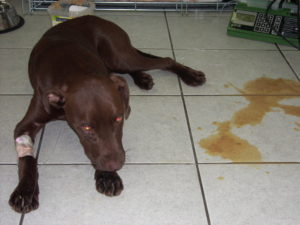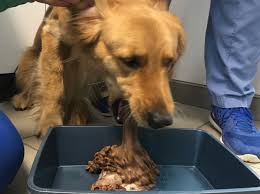 Dogs can’t speak our language and as a result, are not able to tell us when they feel sick.
Dogs can’t speak our language and as a result, are not able to tell us when they feel sick.
This is why it is important to know about issues like vomiting. Often, your dog may throw up after eating grass, which is usually a normal occurrence but should be prevented. Many animals eat grass and vomit to clean out their stomachs.
Other times, your pet may vomit after eating too quickly or after eating bad food. You must keep an eye out, however, as sometimes, vomiting in dogs can be a sign of a much worse problem. Here is some helpful information about dog vomiting and what you can do about it.
Signs and Symptoms of Vomiting in Dogs
Firstly, you must ascertain whether the vomiting is prolonged or episodic. Your pet could have gastritis or a more severe digestive problem. It is important to take note of any unusual signs so that you can report back to the vet for a more accurate diagnosis.
How long has your dog been vomiting? It should not be going on for over a day. Have there been any changes to the dog’s environment or diet? Do they or their parents have a history of digestive issues?
Note whether the vomiting in a doghappens soon after eating or long afterward. Check whether the dog is throwing up undigested food. If they haven’t been digesting their food properly, there can be a gastric disorder, which is not uncommon in many breeds. If there are any other unusual signs that your pet presents (such as depressed mood, quietness, whining, and so on), there could be something else wrong. Contact the vet at once if it appears that there is a problem.
What You Can Do to Aid Recovery
If your pet is recovering from a vomiting spell, you must make sure they get their rest and sufficient fluid intake. It is important, however, that you do not give your dog food or water until they have gone without throwing up for about 6 hours. This is to allow the digestive system to rest and repair its lining.
Afterward, start to offer a little water at a time. If your pet begins to throw up again, be patient. Wait a few more hours before offering more water or food. Some dogs may need a whole day to recover before they can eat and drink water again without getting sick. Once they are able to stomach the water without vomiting, give them a teaspoon about 3-4 times an hour. Gradually increase this amount until your pet seems to have had enough.
If there is no further vomiting, you can offer some chicken broth, but wait at least half a day before giving small portions of food. Keep the food bland, such as a little bit of boiled potato or white rice with skinless chicken or turkey. The next day, you can start mixing this bland food with their normal dog food. Stick to four or five smaller meals instead of the standard one or two a day.
Common Causes and How to Avoid Them
 Your pet’s vomiting can be due to a number of reasons. The most common of these are dietary problems, parasites, medications, metabolic problems, or obstructive disorders. You may not be able to avoid genetic predispositions and disorders, but you can reduce risks and exposure to contributing factors that can worsen the condition.
Your pet’s vomiting can be due to a number of reasons. The most common of these are dietary problems, parasites, medications, metabolic problems, or obstructive disorders. You may not be able to avoid genetic predispositions and disorders, but you can reduce risks and exposure to contributing factors that can worsen the condition.
Do not give your pet any table scraps or leave garbage lying around. It is best not to feed the dog anything other than their dog food or anything that might have not been advised by a vet. Dogs are also very sensitive to dietary changes and food, so keep an eye out for potentially bad reactions or allergies. Keep the environment, feeding bowls, and other pets clean, and always maintain vaccinations and other regular treatments required. This way you will reduce the risk of intestinal and gastric parasites.
In more severe cases, dog vomiting can be a sign of diseases of the liver and kidney or abnormalities in electrolyte levels. So, if you have any cause for concern about your pet, contact the vet as soon as possible.
Remember not to scold your dog for throwing up or for other signs and symptoms. This can be seriously stressful for your canine companion and may even worsen their condition. Be patient with your pet, and monitor them until they are back to their old selves.